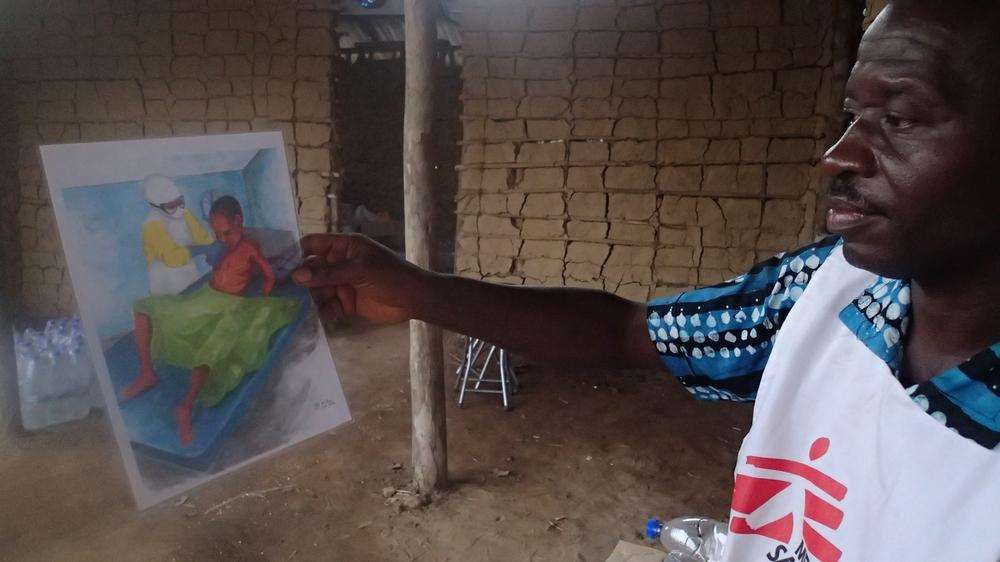Two years after the peak of the Ebola outbreak in Liberia, survivors, families, and health workers are slowly rebuilding their lives. As Doctors Without Borders/Médecins Sans Frontières (MSF) transfers its mental health services to the Liberian Ministry of Health, MSF psychiatrist Frédéric Gelly describes the process of psychological healing that so many must endure.
What effects did the Ebola epidemic have on people’s mental health in Liberia?
More than 4,800 Liberians died from Ebola in 2014 and 2015. Many people saw relatives die; some lost their whole families. Others continue to suffer from an extreme sense of guilt—for being the first in their family to catch Ebola and spread it to others, or for being the only one who survived. Two years later, they ask themselves over and over again: "Why did I survive and others die?"
Religion is one way to deal with death, including rituals around burials. A shared sense of community and common beliefs can help reduce the pain and trauma of those close to you dying. But at the height of the epidemic, even this possibility was denied, as the government had to lay down strict rules about cremating the dead and forbidding burial ceremonies.
Ebola Survivors: Healing Through Sharing
Liberians have had to face other traumatic situations in recent years, including grinding poverty, violence, mass displacement, and death during the 13-year civil war, which ended in 2003. The Ebola outbreak brought back this traumatic period to many, reminding them of a time when they were exposed to death, including the immediate possibility of their own death.
The layer upon layer of traumas helps explain why it can be difficult to put to rest the memories of the Ebola epidemic. Psychological trauma is like a wound: although the skin heals, it still leaves behind a psychological scar.
What are the main challenges Ebola survivors face?
The number of people complaining of physical symptoms—joint pains, headaches, and eye problems—has been decreasing over time, but mental health needs remain, mostly in the form of post-traumatic stress disorder (PTSD) and depression.
With PTSD, the memory of trauma tends to come back again in a destructive form: patients re-experience the trauma itself—as dreams when they are asleep, or as flashbacks during the day—and these experiences provoke the same fear as the original trauma. It’s as if the patient has managed to create scar tissue over their "psychological wound," but it is so thin that just the lowered consciousness of being asleep is enough to reopen the wound.
With depression, patients keep on thinking about the trauma—they can’t exist outside it. In this case, the trauma is like a wound that isn’t allowed to heal, as the patients are always scratching it.
Why did MSF open a clinic specifically for Ebola survivors?
In early 2015, when Liberia was first declared Ebola-free, survivors struggled to find support and care. Not only had the health system virtually collapsed, but they had to deal with stigma and fear of contagion from others, and often they were turned away from health facilities. Often they had lost their home and all their possessions, and sometimes they found themselves completely alone because all their family had died.
Our survivors’ clinic opened in April 2015, with a health team made up of former staff from Ebola treatment centers [that] provided care for both physical and psychological symptoms. Initially, its services were limited to patients who had been discharged from an Ebola treatment center, but in early 2016, it expanded its care to people who were sick during the outbreak but didn’t go to a treatment center, to family members of people who had died, and to health staff and burial teams who had faced highly traumatic situations in the course of their work. More than 600 patients have received care in the clinic since it opened.
Why did MSF decide to phase out its work with Ebola survivors?
The number of consultations at the clinic has stabilized at about 240 consultations per month. At the same time, Liberian authorities have decided to integrate health care for Ebola survivors into the mainstream health system, as stigma in health facilities is perceived as lower today.
We also wondered if a survivors' clinic was helping people to move forward—the very name suggests that our patients are seen in terms of the past and the trauma they have been through.
For these reasons, we have decided to close the clinic in stages, and to send patients to other health facilities which will be able to offer them care for as long as they need it.
Read More: MSF Closes Final Projects for Ebola Survivors in West Africa





